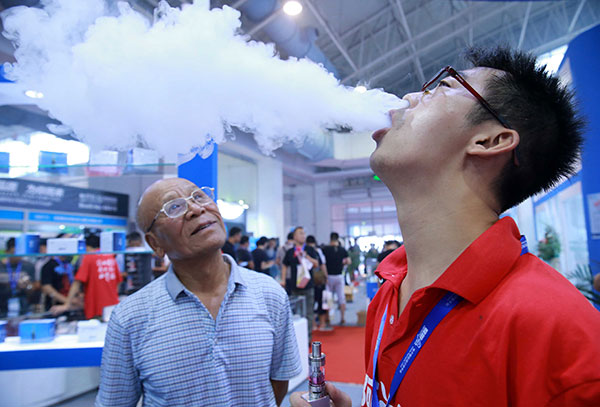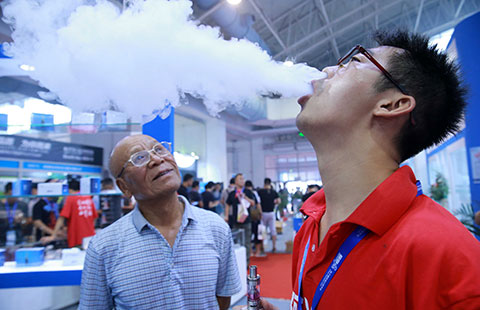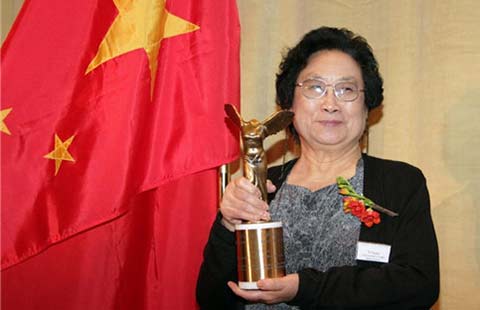Tougher controls urged for e-cigarettes
By Shan Juan/Wang Xiaodong (China Daily) Updated: 2015-10-13 07:43
 |
|
A visitor watches an assistant demonstrate "cloud chasing" at an e-cigarette exhibition in Beijing in July. XIAO CHEN/CHINA DAILY |
Although they may appear to be a safer option than tobacco products, electronic 'vapes' are coming under fire from health groups, who say they are being marketed to impressionable young people as fashion accessories, as Shan Juan and Wang Xiaodong report. Anti-tobacco campaigners and pressure groups are calling for tough regulations to cover the rising use of electronic cigarettes in public places in China. They said e-cigarettes pose a threat to public health and could derail the country's efforts to limit the use of tobacco and related products.
Electronic or e-cigarettes were invented in China in 2003. They use battery-powered cartridges to produce a flavored vapor that often contains nicotine, although not always.
Campaigners are concerned that a device with potentially harmful health effects is being touted as a fashion item that also provides health benefits.
They say the point was underscored at Beijing's first exhibition of e-cigarettes, where attendees, predominantly young people, were fascinated by an emerging "extreme sport" known as "cloud chasing", where "vapers" modify their devices and puff hard to produce a dense vapor that resembles a cloud. Contests are usually sponsored by e-cigarette manufacturers and held at promotions that cater mainly to the younger generation.
China has the world's largest population of cigarette smokers, but there are no regulations covering other products that can deliver nicotine. As a result, e-cigarettes are becoming increasingly popular, particularly with young urbanites, especially as tougher controls on tobacco use come into force nationwide, according to Gan Quan, China director of the International Union against Tuberculosis and Lung Disease.
By the end of last year, there were approximately 900 e-cigarette manufacturers in China, a rise of 200 percent from 2012, producing 80 percent of the global supply. The value of exports of the devices soared to nearly 4 billion yuan ($628 million), more than 150 percent higher than in 2013, and the global market was worth more than $3 billion.
Gan predicted that sales would continue to rise in China because e-cigarettes are widely available online and in brick and mortar "boutiques" that are springing up to exploit the trend.
Circumventing the banWang Li, a saleswoman at an electronic tobacco store in Beijing's Chaoyang district, said the June 1 introduction of a ban on smoking indoors in the capital has boosted the public profile of e-cigarettes. "More customers have come to our store to inquire about electronic cigarettes since the new smoking regulations took effect," she said.
"You can see people using electronic cigarettes in many places, such as nightclubs," she added. "Now, smoking is banned in many places, but electronic cigarettes are generally exempt from inspection. You see? Puffing out the fog can be fun," she said, pointing at a young man who was testing an e-cigarette.
Wang said her store sells dozens of different types of e-cigarettes-prices range from about 400 yuan to 3,000 yuan each-and stocks more than a dozen different liquid tobaccos, including some that are high in nicotine and taste like cigars and others that have lighter, fruity flavors, such as lemon and strawberry.
Liquid tobacco doesn't contain tar and is less harmful than traditional cigarettes, but e-cigarettes are unlikely to help smokers stub out the habit, she said. "They won't help smokers to quit quickly, but some electronic cigarettes use a liquid that contains less nicotine, so they can be a healthier substitute for cigarettes."
The cheaper items sell best, but many people prefer to buy expensive products imported from the United States. "Nowadays, people are more concerned about their health, so why not buy one as a healthy gift for a friend?" the assistant said.
A customer, who gave his surname as Zhao, has smoked for 10 years, but recently decided to quit for the sake of his health. "I bought one because I want to quit smoking. I wasn't sure if it would work, so I just wanted to give it a try," he said.
The owner of an e-cigarette store in a Beijing shopping mall said the product is very popular in fashion-able bars and nightclubs, and many young people buy them as fashion items, not as aids to quit smoking.
"Usually, no one will punish people for using electronics cigarettes in public places," said the man, who declined to give his name. "You can smoke one right here in the mall and no one will care."
Zhang Jianshu, head of the Beijing Tobacco Control Association, said the vaping trend is an emerging social problem. "We have received complaints about the unlimited use of e-cigarettes in public places," he said.
However, a lack of regulations means that "at present we can do nothing about it. Besides, traditional cigarettes are, of course, our top priority for tobacco control," he said.
The Beijing government has opened two public platforms-a telephone hotline (12320) and a public account on WeChat, a popular instant messaging platform-to allow people to report smoking in violation of the capital's ban.
- Series of measures announced to lift 70m out of rural poverty
- Disgraced security chief 's allies imprisoned
- Photos of stewardesses in overhead luggage lockers spark disputes
- Tougher controls urged for e-cigarettes
- Air pollution still public's top concern
- Former PetroChina chairman Jiang Jiemin sentenced to 16 years in prison
- Reforms spark legal brain drain
- Examiners get tough on students who cheat
- Stay off your smartphones while on the road, drivers are warned
- Nanjing Massacre files inscribed on Memory of World Register







